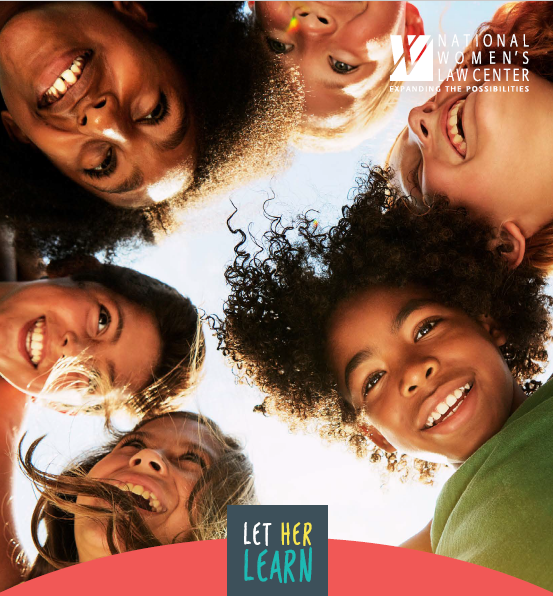All gifts, up to $10,000, matched until June 30!
NWLC Releases Sexual Harassment Toolkit Equipping K-12 Students to Advocate for Their Title IX Rights
(Washington, D.C.). The National Women’s Law Center (NWLC) is equipping students with a toolkit to advocate for their Title IX rights to be free from sexual harassment at school—a necessary and timely effort, given that, according to leaked documents, the Department of Education will soon propose changes to Title IX regulations that will encourage schools to ignore and even punish students who report sexual harassment.
A Toolkit to Stop School Pushout for Girls Who Have Experienced Sexual Harassment, part of NWLC’s Let Her Learn series, provides an easy-to-use, step-by-step checklist to help all students find out if their school treats them fairly when they have been sexually harassed. Importantly, the toolkit clarifies that Title IX requires schools to investigate all incidents of sexual harassment of which it has notice, in order to find out whether the harassment has made it harder for students to learn or stay in school—regardless of where the harassment occurred, who the harasser was, and what actions the police have taken. Like NWLC’s first Let Her Learn toolkit, which helps girls of color advocate against unfair discipline policies, the sexual harassment toolkit features simple explanations, illustrative examples, and sample dialogue—all written at a seventh-grade reading level.
“Sexual harassment should never be the end of anyone’s education, but we as a nation have focused disproportionately on the educational needs of alleged harassers over students who have been harassed,” said Elizabeth Tang, author of the toolkit and an Equal Justice Works Fellow at NWLC sponsored by Pillsbury Winthrop Shaw Pittman. “This toolkit re-centers the narrative on students who are targeted by sexual harassment—and potentially pushed out of school as a result. It explains the law in a way that is accessible to them.”
The toolkit helps its readers answer key questions, including whether their school is covered under Title IX, how and to whom to report sexual harassment, what accommodations their school should offer, what is required in a fair and trauma-informed investigation, and what types of conduct constitute prohibited retaliation. Throughout the toolkit, readers are reminded: Sexual harassment is never the victim’s fault.
“As Secretary DeVos continues her destructive—and likely unlawful—campaign against Title IX, it’s important for students to know that Title IX is still the law of the land,” said Emily Martin, NWLC Vice President for Education & Workplace Justice. “Sexual harassment that goes unaddressed in a school setting is still illegal sex discrimination.”
For students whose schools are not following the law, the toolkit offers suggestions on how to file an appeal and collaborate with school and local officials to create better, fairer, and safer policies. If students want legal support, the toolkit encourages them to visit NWLC’s Legal Network for Gender Equity to be connected to attorneys.
###
For immediate release: October 2, 2018
Contact: Olympia Feil ([email protected]) or Maria Patrick ([email protected])




